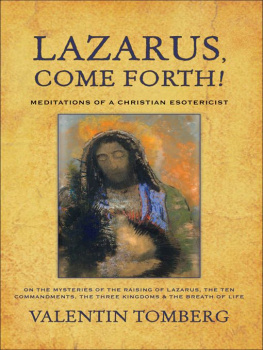LAZARUS, COME FORTH!
LAZARUS,
COME FORTH!
MEDITATIONS OF A CHRISTIAN ESOTERICIST
ON THE MYSTERIES OF THE RAISING OF LAZARUS, THE TEN COMMANDMENTS, THE THREE KINGDOMS & THE BREATH OF LIFE
VALENTIN TOMBERG
ENGLISH TRANSLATION
ROBERT POWELL & JAMES MORGANTE

AN IMPRINT OF ANTHROPOSOPHIC PRESS, INC.610 Main Street, Suite 1Great Barrington, MA, 01230
Copyright 2006 by Lindisfarne Books. All rights reserved. No part of this publication may be reproduced, stored in a retrieval system, or transmitted in any form or by any means, electronic, mechanical, photocopying, recording, or otherwise without the prior written permission of the publisher.
COVER IMAGE: The Sacred Heart. 1910 Odilon Redon (18401916), pastel | Louvre, Paris
PHOTO: C. Jean. Fonds Orsay; Runion des Muses Nationaux | Art Resource, NY cover and book design: William (Jens) Jensen
ISBN: 1-58420-040-5
ISBN-13: 978-1-58420-040-6
LIBRARY OF CONGRESS CATALOGING-IN-PUBLICATION DATA
Tomberg, Valentin.
[Lazarus, komm heraus. English]
Lazarus, come forth!: meditations of a Christian esotericist on the mysteries of the raising of Lazarus, the Ten commandments, the Three Kingdoms, and the Breath of Life / Valentin Tomberg; English translation, Robert Powell & James Morgante.
p. cm.
ISBN-13: 978-1-58420-040-6
ISBN-10: 1-58420-040-5
1. Anthroposophy. 2. ChristianityMiscellanea. 3. Raising of Lazarus (Miracle) 4. Ten commandments. 5. Spiritual life. I. Title.
BP 595.T6613 2006
299.935DC22
2006013736
Table of Contents
Translators Foreword
ALTHOUGH HE IS well-known to many of the spiritually minded in Europe, most readers in the United States will not know the name Valentin Tomberg, who must surely be acknowledged as one of the great Christian mystics of the twentieth century. The publication in English translation of four writings by this remarkable person is intended to remedy this situation.
Who was Valentin Tomberg? He himself attached no significance whatever to biographical details concerning him. His entire life was one of service to the Living Christ. Outwardly seen, he lived an ordinary life. He was married, with one son, and held a secure position with the British Broadcasting Corporation in Reading, England, monitoring radio broadcasts from the Soviet Union. As a Russian emigrant, he was well-equipped to do this work.
Yet behind the modest circumstances of his outer life, this humble man was in constant communion with the World of Spirit. His true lifes work was on a level transcending, but at the same time serving, that of normal day-to-day existence. Daily, his heart and mind were directed to helping to bring to realization the concerns of the Divine, to finding solutions to the problems of humanity, and to caring for natureall of this in service of Christ.
Something of this higher life shines through in the four works published here. These four writings were written toward the end of his life. He was born in St. Petersburg on February 26, 1900 (February 14, 1900 in the Julian calendar) and died on February 24, 1973. The last work (The Breath of Life) remained a fragment; he was working on it at the time of his death.
The manuscripts were written in German. (He was fluent in Russian, Estonian, German, French, English, and Dutch, as well as being a scholar of Latin, Greek and Hebrew.) A German edition of these four writings was published by Herder Verlag in 1985. The English translation, however, was made from typewritten copies of the authors manuscripts, in order to remain true to the authors original text. The translation was the result of teamwork, and heartfelt thanks are extended to those who contributed to this endeavor.
The reader will find in these four works an extraordinary depth of spirituality which will help to enrich ones understanding of the human beings relationship to God in a living and highly original way. A mystical breath breathes through these four works that cannot fail to touch the heart of the meditative reader, giving one substance for ones own meditations and perhaps bestowing a new experience of the World of Spirit. And those readers who are engaged on a spiritual path will discover here a wonderful source of support and encouragement extended to them from someone who explored the heights and depths of existence and attained to the essence of the Divine.
ROBERT POWELL
PART ONE
THE MIRACLE OF
RAISING LAZARUS
IN WORLD HISTORY
Introduction
THIS WORK IS neither a theological treatise nor a contribution to the science of history. For both theology and the science of historysomewhat in the manner of the games chess and draughtshave their fixed rules of the game, which are strictly adhered to in order to arrive at theologically or historically valid results. Thus, in order to be considered historically true, an event must not only be attested to by genuine contemporaneous documentary evidence, but also must neither contradict the testimony of other documentary sources nor stand in contradiction to contemporary general life experience. For this reason, the account of the life of Apollonius of Tyana given by Philostratus is not considered to be historically true, because at the judicial proceedings in Rome (under the chairmanship of the emperor) at which Apollonius was present as a defendant, Apollonius brought the trial to an end by leaving unseen, i.e., by simply disappearing from the court. For although Philostratus book is certainly a genuine document from antiquity, it is not contemporaneous (it was written over two centuries after the death of Apollonius of Tyana) and, moreover, the report contradicts contemporary general life experience since the disappearance of a defendant during the course of a trial does not happen nowadays. Consequently Philostratus account does not belong to historical truth but to the realm of myth-making, fantasy, error, etc. To put it simply, it belongs to the sphere of untruth.
It could happen that someone today might hesitatingly venture to raise the objection that Philostratus book is avowedly only a literary recasting of the notes of an eyewitness, those of Apollonius Assyrian pupil, who accompanied him on his travelsand was his life companion for several decadeswho was, so to say, his Eckermann (the biographer of Goethe). In this case it might be said the possibility is not excluded that Apollonius could actually have made use of suggestion along the lines of that of the Indian fakir, as experience with hypnosis and suggestion shows. Thus, the Indian fakir shoots a rope high into the air, making it stand stiff as a pillar, and then lets the onlooker see how a boy nimbly clambers up it, while a photograph shows only a picture of the peacefully seated fakir and the just-as-peacefully seated boy. Apollonius was certainly a pupil in India for a lengthy period of time, so this possibility does existand, consequently, Philostratus account could still be true. I do not know if someone has actually raised this simple objection, but if someone were to do so, the probable reply would be that historical research is in no way parapsychology or psychic research. It would be said that one could certainly leave the case of the disappearance of Apollonius of Tyana from the emperors judicial court in Rome to the Society for Psychical Research, but it lies beyond the scope of historical research. Thus it would be appraised as a matter for parapsychologists, depth psychologists along the lines of the Jungian school, occultists, etc., but not as something for the research historian. So, we may conclude that to the best of our knowledge and in good conscience, Philostratus account could be true in itself, but that it does not count as true from a historical standpoint.
Next page












 AN IMPRINT OF ANTHROPOSOPHIC PRESS, INC.610 Main Street, Suite 1Great Barrington, MA, 01230
AN IMPRINT OF ANTHROPOSOPHIC PRESS, INC.610 Main Street, Suite 1Great Barrington, MA, 01230